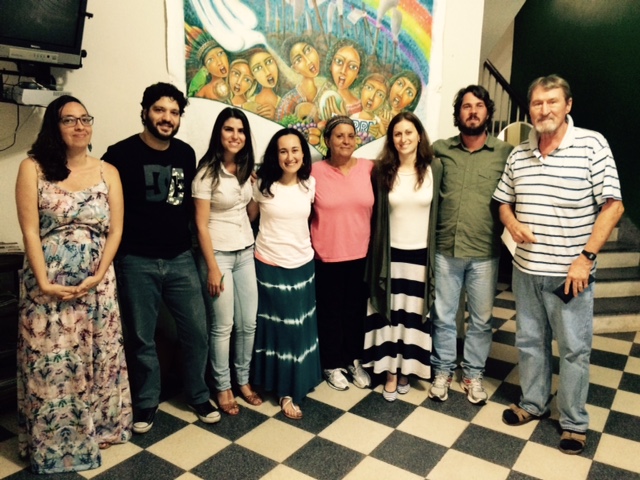Empowering local communities to document violations, opens door for dialogue with companies
 Oxfam and CPT staff in March 2015. Source: CPT.
Oxfam and CPT staff in March 2015. Source: CPT.
Community-based human rights impact assessments (COBHRA) help evaluate the impacts of a company’s operations and have the potential to change the nature of dialogue between companies and those most directly affected.
Daniella Burgi-Palomino is a COBHRA Policy Fellow.
About five years ago I marched fifteen miles with Oxfam partner the Farm Labor Organizing Committee (FLOC), union members, students, and community supporters to raise awareness of the rights of North Carolina tobacco pickers. We called on tobacco giant Reynolds American, Inc. to negotiate with FLOC for improved working conditions for these workers.
I remember walking alongside farmworkers who told me how they regularly toiled under the hot North Carolina sun picking tobacco with few breaks and earning well below the minimum wage. These conditions hadn’t changed much since farmworker leader Cesar Chavez led the first strikes against growers in California in the 1960s.
FLOC had been organizing for four years with Oxfam support to change the conditions of these North Carolina laborers. Yet Reynolds consistently refused to negotiate with FLOC, arguing that the farmworkers worked for an independent contractor and were not Reynolds employees; even claiming that farmworkers were actually satisfied with their working conditions according to an independent survey they had carried out.
As an effort to step up these campaign efforts, Oxfam partnered with FLOC to carry out a community based human rights impact assessment with the Getting It Right tool and to document the human rights violations that farmworkers experienced on a daily basis. The State of Fear report called on Reynolds to take responsibility for ending the human rights violations in its supply chain.
Following the publication of the report, Reynolds American, Inc. executives agreed to meet with FLOC President Baldemar Velasquez for the first time ever in 2012. Since then, FLOC President Velasquez and top Reynolds executives are currently discussing changes in their supply chain that would guarantee freedom of association and protection from retaliation if workers complain about abuses.
Oxfam believes that community approaches to assess the impacts of a company’s operations, such as the one carried out by FLOC in North Carolina, have the potential to change the nature of dialogue between companies and those most directly affected. Community based human rights impact assessments provide the company with evidence based analysis of human rights violations that they are causing and leave them little room to ignore these claims.
Oxfam has been promoting this type of approach for some time now, here in the U.S. and overseas.
This past month, for example, Oxfam began supporting a new community based human rights impact assessment to be led by the Comissão Pastoral da Terra (CPT), an organization dedicated to protecting the rights of peasant families and rural workers in the northeastern state of Pernambuco in Brazil.
Here, fisherwomen and fishermen from the River Estuary Sirinhaem community on the southern coast of Pernambuco say that Trapiche SA, one of the largest sugar producers in Brazil and a supplier to major brands like Coca Cola and Pepsico, has been pouring chemicals and pesticides into the river water making it almost impossible for them to fish and carry out their main source of livelihood. Trapiche also forcibly removed them to the outskirts of the town and even further away from the river, claiming control over these lands.
The community members who tried to complain about these issues, such as fisherwomen Maria de Nazareth and her sister Maria das Graças, were criminalized and persecuted by the company. When these women became the last two residents to be expelled from the islands in the mangroves, CPT decided to document the environmental effects and removals in a systematic manner with the Getting It Right tool.
Like the FLOC report did, Oxfam believes that the report of this assessment could help bring national and international pressure for Trapiche SA to acknowledge the impacts of its operations in the community and change its policies.
In the face of what might seem like enormous challenges, a community human rights impact assessment (COBHRA) is an important bottom-up approach, a way for communities to be directly involved in exercising their rights and presenting their version of the difficult reality they face on a daily basis and a way of putting them on the same footing as the transnational companies violating their rights and lands.
Oxfam is proud to be working with organizations like FLOC and CPT who are taking the initiative to stand up and demand their rights from transnational companies. Though small steps, their wins are important in ensuring that companies begin to meet transparency, participation and accountability standards for their investment projects around the world.
Stay tuned for more updates on the progress of the Brazil CPT assessment and the COBHRA initiative (www.oxfamamerica.org/hria)